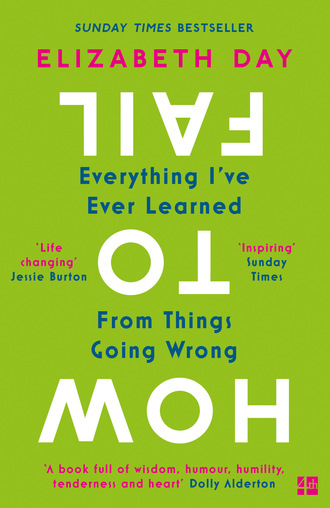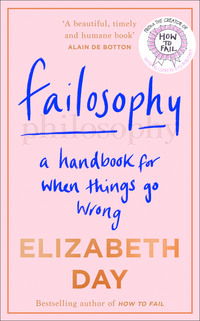
Полная версия
How to Fail
‘You’re not staying then?’ he asked plaintively when I emerged.
‘No … erm … deadlines … so sorry … lovely evening …’ I said, backing out of the door like a faithful retainer leaving an audience with the Queen. ‘Speak soon!’
Outside, I took out my phone and called my ex-boyfriend. He answered and said he was missing me. We met the next day and got back together. We went out for another year.
As I walked to the tube in the early hours of that particular morning, I reflected that I had tried my best to live out the fantasy of my twenties, to experience the heady whirl of irresponsible youth and casual sex, and yet, when it came down to it, I’d rather be in a steady relationship and have a bath and an early night.
It felt like an extended metaphor for the whole decade: that shifting tension between where you wanted to be, where you thought you should be and where you were right now.
It was the same with work. The Londoner’s Diary was great training for spotting a story and writing it to deadline, but I was desperate to be getting on with the business of being a ‘proper’ journalist.
I was in a job in the area I most wanted to have a career – journalism – but it wasn’t the one I was really after, and it would take me several more years to get there.
I was in a long-term relationship that wasn’t serious enough to lead to marriage and wasn’t fun enough to be casual.
I was in a house-share that, on paper, should have been a place of hedonistic excess but was mostly just a nice terrace inhabited by people who reminded each other of the need to buy toilet roll and made tray-bake brownies from Nigella’s latest cookbook when they had a spare couple of hours on a Sunday.
It didn’t help that there was so much cultural baggage around one’s twenties. When this particular decade was represented on screen, it looked as if everyone else was having a fabulous time. The mood music of my twenties was provided by the Friends theme tune and the clatter of Sex and the City heels on New York sidewalks. But it never translated into real life. The rest of us who didn’t hang out with their closest pals in Central Perk coffee shop or drink Cosmopolitans and discuss the female orgasm were left labouring under the misapprehension that we were failing to make the most of it.
I remember my twenties being a decade in which no one talked – not really, not honestly – about the things they felt unhappy about or the stuff that was going wrong in their lives. It was, instead, ten years of trying to put on a good show – for yourself and for anyone else who might be watching. It was ten years of moving forwards while groping blindly for the point of it all; ten years of building a career but feeling impatient at the lack of pace; ten years of wondering who you were meant to be dating and how you would find the mythical right ‘one’; ten years of casually assuming you had all the time in the world while knowing you were running out of it, to the extent that turning thirty seemed to me to be a giant cut-off after which I would never be truly young again.
One of the most interesting revelations that came from the How To Fail podcast was how many other people struggled with this period of their life. I’d assumed that my interviewees would have nightmare tales to tell of adolescence (I’d been preternaturally well behaved as a teenager, and I expected others to have misbehaved for me) but actually, it was their twenties that came up again and again as a time of immense transition and uncertainty. Unlike me, who had been lucky enough to know what I wanted to do professionally, many of those I spoke to had had little idea of what their future held, and that brought its own challenges.
The writer Olivia Laing chose the entirety of her twenties as one of her failures, because she dropped out of university.
‘I completely fucked up my twenties,’ she said. ‘I went to university for a year and then I dropped out and lived on road protests. So I was a dreadlocked, incense-smelling hippy really. I completely dropped out of society. I was very non-material …
‘Then I really didn’t have any money. I was working as a cleaner, I was working, doing the filing for an accountant. And I was in my late twenties, and I couldn’t see any way out of it … It’s very hard to drop back in [to society] again. So yeah, it was a very, very dark period. And a very long, dark period.
‘You know, at the time I thought, “What does a degree matter?” And I just hadn’t really realised the entire infrastructure that going to university builds for you in your life. It’s not just education, which I think I sort of patched together on my own anyway. It’s that you don’t have a circle of friends that are also doing things. You’re not part of that sort of professional world at all. And the older I got, the more it became clear that I really slipped between the cracks somehow. And it is so hard to get back in.’
Phoebe Waller-Bridge struggled to get the parts she wanted at RADA and felt so broken down by her tutors that she lost confidence and spent much of her twenties failing at auditions or being typecast as the posh, hot girl until she began writing her own material.
Sebastian Faulks recalled being ‘optimistic as a child. So although very shy, I was essentially a jolly little chap. I looked on the bright side. And I think I became essentially pessimistic in my twenties really. And you know, I’ve had to fight pretty hard to try and look on the upside. But I think … I’m not sure it’s a terribly intellectual thing. I think it’s more of a temperamental thing. My physiology or temperament or whatever word you want to use. And the place where they meet, perhaps, is naturally a touch on the gloomy side. So I do have to try pretty hard to be optimistic.’
We were talking in one of the expansive rooms in Faulks’s beautiful Notting Hill home. The window gave out onto a long garden, bordered by rose bushes not yet in flower. Faulks sat in a chair, surrounded by piles of books, and every now and then our interview would be interrupted by the skittering sound of his dog’s feet on the parquet. Faulks had been mildly amused by the idea of my podcast series and wasn’t quite sure what I was trying to get at by doing it or that he’d have anything of interest to say. I’d told him that was my responsibility: I’d have to ask the right questions.
And so I pressed him on what had been going on in his twenties to cause that change in outlook: the shift from optimism to pessimism, as he described it.
‘Well, at Cambridge, which I didn’t like as well as not liking school, I just sort of struggled to adapt really to fit in academically … I was still quite competitive in some strange way and I thought perhaps I ought to get a first, and I ought to do this, and that … I was just confused and I drank too much and smoked too much and became very confused and unhappy. And I dropped out really, I suppose you’d say. And I was aged twenty-two or -three and I was extremely confused and very fragile and it took quite a lot of time to get over that. I wouldn’t say I have got over it really.
‘I mean, life is a continuous negotiation really with yourself and other people and company and the kind of company you want, how much company you want, how much you want to give, how much you want to take, what form and shape that takes. Especially if you’ve had this tremendous shyness as a child [and] still have to some extent. You know, you do change, that’s another thing you’re negotiating, the actual changes that take place in you, the different ways that you react as you get older, to people, families, situations, friendships and so on.’
Two things struck me about this answer. One was Faulks’s sense that he ‘ought’ to be feeling a certain way and doing certain things in his twenties. The other was the significance he attributed to change, at a time when many of us are negotiating not only salaries and rent deposits but relationships with partners and families too. We are half child, half adult, with a foot in both camps. We lack the innocence and irresponsibility of childhood but most of us don’t yet have the skills to navigate adulthood because our identities are still being shaped.
I was born in 1978 and am a classic Generation X-er. My mother was part of a 70s generation who fought feminist battles for their children’s future, but who also belonged to a traditional domestic set-up where the lion’s share of household duties – including raising children – fell to the women. When I went to my all-girls secondary school I was taught that I was not defined by my biology. In fact, the majority of my sex education (such as it was) was focused almost entirely on the importance of not getting pregnant before you had established yourself in your career.
So I entered my twenties with a series of mixed messages. I knew it was important to forge a professional path. But I also expected to be married before the decade was out. I think that’s why I kept finding myself in serious relationships, rather than having a more relaxed attitude to intimacy, and it’s also why my twenties were pretty busy and stressful: not only was I trying to carve out the perfect career, but I was also attempting to nail down a perfect romantic partnership. As time went on, I felt I was failing at both. I was impatient for everything to be sorted and I didn’t realise that your twenties are a time of transition, of flux and that being in the change is the point of them.
As a result, I struggled.
For millennials, who entered the job market at precisely the time the 2008 global financial crisis struck, it must be even worse. They have been brought up in a hyper-connected age where everything from dating to grocery shopping can be done online, where contemporaries are boasting about their amazing lives on social media, where rents are high, property prices astronomical and where job insecurity is rife. There’s a scene in Lena Dunham’s Girls, the millennial sitcom of choice, in which Dunham goes in to get tested for an STD and her gynaecologist sighs, ‘You couldn’t pay me enough to be twenty-four again.’ Dunham’s response is, ‘Well, they’re not paying me at all.’
But some things are universal whatever generation you belong to. Most of us will experience the loss of loved ones in our twenties. My maternal grandfather, to whom I was very close, died in my second year at university. When I was twenty-three, that beloved former boyfriend who kept eating all the food I bought, was killed in Iraq where he had gone as a freelance journalist to cover the conflict. It was a shock from which I have yet to recover and I suspect it’s the kind of shock from which one never does. A few years later, a colleague of mine who battled with alcoholism was found dead on the floor of his flat. I lost my paternal grandmother shortly afterwards. Many of us will have similar stories: your twenties are often when you first come face to face with mortality, with the sense that all of us are, to a lesser or greater degree, running out of time.
It was the decade I first went into therapy. My friend (also in her twenties) passed on the number of her therapist and when I called, the phone rang out and clicked into voicemail. I had intended to leave a short message with my details but ended up gulping back the tears while I tried to explain what was happening in my life, all the time being hamstrung by British politeness and a sense that I was being terribly self-indulgent.
‘I’m not exactly where I want to be professionally,’ I said. I was standing in the corridor of my office when I made the call, surrounded by copies of old newspapers and the sound of the ladies’ lavatory door clanging shut. ‘It would be great if you were able to see me.’
For the next three months, I went to an office in a red-brick house in Queen’s Park, north-west London, every Wednesday morning before work. My therapist was an attractive woman in her late forties with shoulder-length greying hair and a penchant for statement Bakelite necklaces. She would open the door to me when I arrived and not say anything to me beyond a cursory hello, and I would follow her up the stairs trying to make agonising small talk until I realised after a few weeks that there was no point in trying to charm her. The awkward silence was part of the therapy. It was about making me feel comfortable with being uncomfortable. It was about making me choose honesty without worrying about what she would think of me and whether she would like me or not.
Her therapy room was kitted out, as I have since discovered, like almost every therapy room I’ve ever been in: anonymous Ikea furniture, a generic pot-plant, a box of tissues on a low table and a subtly placed clock so that you can see when your session is coming to an end. Within those four walls, I made some interesting discoveries. One of them was that your twenties could be a ‘gestation period’.
My therapist would couch her opinions in a series of questions, designed to make me feel I’d cleverly come to conclusions about my own behaviour by myself. And so it was that one day, she said: ‘Do you think that maybe, you’ve been through quite a lot already and been operating at a fairly frantic pace, and that perhaps this is a necessary time of reflection, of allowing the next phase to hatch?’
It was an incredibly helpful moment. It allowed me to let go of some of the ‘oughts’ and the ‘shoulds’ that had been crowding out my thoughts, those shrill internal critics that were taunting me with the idea of what other people were doing and how I was failing to keep up. I relaxed a bit.
At my thirtieth birthday party, held in an upstairs room at my favourite pub with a playlist designed especially by me and full of 1990s hip-hop, I felt happy. In fact, I felt relieved to have made it through my twenties and relieved that I no longer had to worry about turning thirty. It was done. I was a little bit wiser. A little bit more self-aware. In a few months’ time, although I did not know it then, I would sell my first novel.
Looking back now, I suppose I would categorise my twenties as a decade of impatience, where I wanted to be at the mythical happy end point, but had to sort through a whole lot of stuff to get there. They were also a decade of worrying I wasn’t doing them right, that I wasn’t being footloose enough or responsible enough and that, caught in the unsatisfactory mid-point between the two, I was failing to make the most of them.
The author David Nicholls, who spent most of his twenties trying and failing to make it as an actor before turning his hand to writing, said that he now realised ‘there are ways out, that we’re not fixed at the age of twenty-two, twenty-three, that life is long and you can try things for a while and if they don’t work out, do something else’.
But of course, it’s only when we’re older and have knocked about a bit that we can conclude there is no uncomplicatedly happy end point. There are a series of points – some happy, some sad, some simply quietly contented – and each one will be different from how we imagined it. Not better or worse; just different. And perhaps what surviving your twenties makes you realise is that life, after all, is texture.
‘I feel like I did it [my twenties], I committed to it,’ Phoebe Waller-Bridge said when I spoke to her about her own decade of transition. ‘I’d really like to have the skin from my twenties,’ she joked, ‘but I prefer my heart and my guts now.’
That’s the thing. Because however much you might feel you’re failing at your twenties when you’re living through them, they are a necessary crucible. Your twenties are spices in a pestle and mortar that must be ground up by life in order to release your fullest flavour. By the end of them, you’ll have more heart and more guts – and you’ll know never to roast broccoli again.
Конец ознакомительного фрагмента.
Текст предоставлен ООО «ЛитРес».
Прочитайте эту книгу целиком, купив полную легальную версию на ЛитРес.
Безопасно оплатить книгу можно банковской картой Visa, MasterCard, Maestro, со счета мобильного телефона, с платежного терминала, в салоне МТС или Связной, через PayPal, WebMoney, Яндекс.Деньги, QIWI Кошелек, бонусными картами или другим удобным Вам способом.



